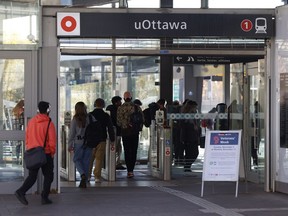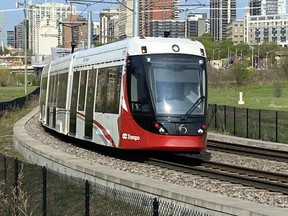Health
Student Unions Reject OC Transpo’s Proposed Fare Increases

As the City of Ottawa prepares to finalize its budget for the upcoming year, student unions are voicing strong opposition to a proposed transit fare increase of five percent. According to the University of Ottawa Students’ Union, this increase has not been formally approved, contradicting the city councillors’ decision from November 2022.
Student leaders emphasize that existing legal agreements restrict fare hikes to a maximum of 2.5 percent annually. Jack Coen, president of the University of Ottawa Students’ Union, stated that negotiations regarding this fare hike had stalled after former OC Transpo general manager Renée Amilcar approached the union last spring. Amilcar resigned in June, further complicating discussions surrounding student transit costs.
At Carleton University, the cost of transit for students increased to $234.80 per semester, adhering to the previously agreed limit. Aidan Kallioinen, vice-president of student issues at the Carleton University Students’ Association, noted that while OC Transpo has suggested a five-percent fare increase, no agreement has been reached. He stated, “Politicians are prone to put things in the budget. A quick conversation would reveal there’s no way to do that in the short term.”
The U-Pass program, a product of referenda at several institutions, including Algonquin College and Saint Paul University, allows students unlimited travel on OC Transpo and the Société de transport de l’Outaouais (STO). While it facilitates affordable fares for students, many express dissatisfaction, as they must pay for the pass regardless of usage. Coen noted frequent complaints from students about the inability to opt out of the U-Pass, contrasting it with options available for student insurance plans.
On October 24, 2023, the city’s finance and corporate services committee approved a budget direction that includes potential fare increases ranging from 2.5 to 7.5 percent. Capital ward Councillor Shawn Menard cautioned that any increase beyond 2.5 percent could alienate the student population, which contributes significantly to OC Transpo’s revenue. According to Menard, U-Pass agreements account for 19 to 27 percent of annual revenues for OC Transpo.
Menard also highlighted that the U-Pass rate is among the highest in Canada, warning that exceeding the agreed fare increase could trigger new student referenda, which may not favor the city. “We need this discussed and make sure that the U-Pass is maintained for decades to come in this city,” he remarked, emphasizing its critical role in student transit.
Coen expressed skepticism regarding the viability of a fare increase exceeding 2.5 percent, especially in light of recent service cuts. He remarked, “Even though a five-percent boost would represent only about $22 more a year to each student, I don’t hear the argument that we should pay more for less service.” Kallioinen echoed this sentiment, stating that any referendum during a cost-of-living crisis would likely result in opposition to fare hikes.
During the finance committee meeting, transit commission chair Glen Gower advocated for maintaining low fares, asserting that it is reasonable to expect some increases. He noted that the current U-Pass rate of $57.25 per month is significantly lower than the adult pass rate, which places financial strain across other fare categories, including those for seniors and low-income residents.
Gower emphasized the importance of engaging in discussions with student bodies and institutions to address the fare structure. “The U-Pass is an incredible deal for students,” he said, stressing the need for collaboration to ensure its sustainability.
Coen, who resides in Sandy Hill, argued that many students would prefer to pay for transit as they use it, emphasizing that the city should not rush to implement fare increases without proper dialogue. He stated, “The city is in a ‘shoot first and ask questions later’ mode if they think they can bully their way through this.”
As discussions continue, the future of transit fares and the sustainability of the U-Pass remain at the forefront of student concerns in Ottawa.
-

 Lifestyle2 weeks ago
Lifestyle2 weeks agoChampions Crowned in Local Golf and Baseball Tournaments
-

 Science3 weeks ago
Science3 weeks agoMicrosoft Confirms U.S. Law Overrules Canadian Data Sovereignty
-

 Education2 weeks ago
Education2 weeks agoRed River College Launches New Programs to Address Industry Needs
-

 Technology2 weeks ago
Technology2 weeks agoDragon Ball: Sparking! Zero Launching on Switch and Switch 2 This November
-

 Science3 weeks ago
Science3 weeks agoTech Innovator Amandipp Singh Transforms Hiring for Disabled
-

 Technology3 weeks ago
Technology3 weeks agoWorld of Warcraft Players Buzz Over 19-Quest Bee Challenge
-

 Technology3 weeks ago
Technology3 weeks agoGoogle Pixel 10 Pro Fold Specs Unveiled Ahead of Launch
-

 Science2 weeks ago
Science2 weeks agoChina’s Wukong Spacesuit Sets New Standard for AI in Space
-

 Science3 weeks ago
Science3 weeks agoXi Labs Innovates with New AI Operating System Set for 2025 Launch
-

 Technology3 weeks ago
Technology3 weeks agoNew IDR01 Smart Ring Offers Advanced Sports Tracking for $169
-

 Technology3 weeks ago
Technology3 weeks agoGlobal Launch of Ragnarok M: Classic Set for September 3, 2025
-

 Technology3 weeks ago
Technology3 weeks agoFuture Entertainment Launches DDoD with Gameplay Trailer Showcase
-

 Health2 weeks ago
Health2 weeks agoB.C. Review Urges Changes in Rare-Disease Drug Funding System
-

 Technology3 weeks ago
Technology3 weeks agoHumanoid Robots Compete in Hilarious Debut Games in Beijing
-

 Science3 weeks ago
Science3 weeks agoNew Precision Approach to Treating Depression Tailors Care to Patients
-

 Technology3 weeks ago
Technology3 weeks agoInnovative 140W GaN Travel Adapter Combines Power and Convenience
-

 Business3 weeks ago
Business3 weeks agoNew Estimates Reveal ChatGPT-5 Energy Use Could Soar
-

 Health2 weeks ago
Health2 weeks agoRideau LRT Station Closed Following Fatal Cardiac Incident
-

 Health3 weeks ago
Health3 weeks agoGiant Boba and Unique Treats Take Center Stage at Ottawa’s Newest Bubble Tea Shop
-

 Science3 weeks ago
Science3 weeks agoNew Study Reveals Surprising Impact of Gratitude on Helping Behaviors
-

 Technology3 weeks ago
Technology3 weeks agoQuoted Tech Launches Back-to-School Discounts on PCs
-

 Technology3 weeks ago
Technology3 weeks agoDiscover the Relaxing Charm of Tiny Bookshop: A Cozy Gaming Escape
-

 Technology3 weeks ago
Technology3 weeks agoBorderlands 4 Promises Massive Changes with 30 Billion Guns
-

 Lifestyle2 weeks ago
Lifestyle2 weeks agoVancouver’s Mini Mini Market Showcases Young Creatives










